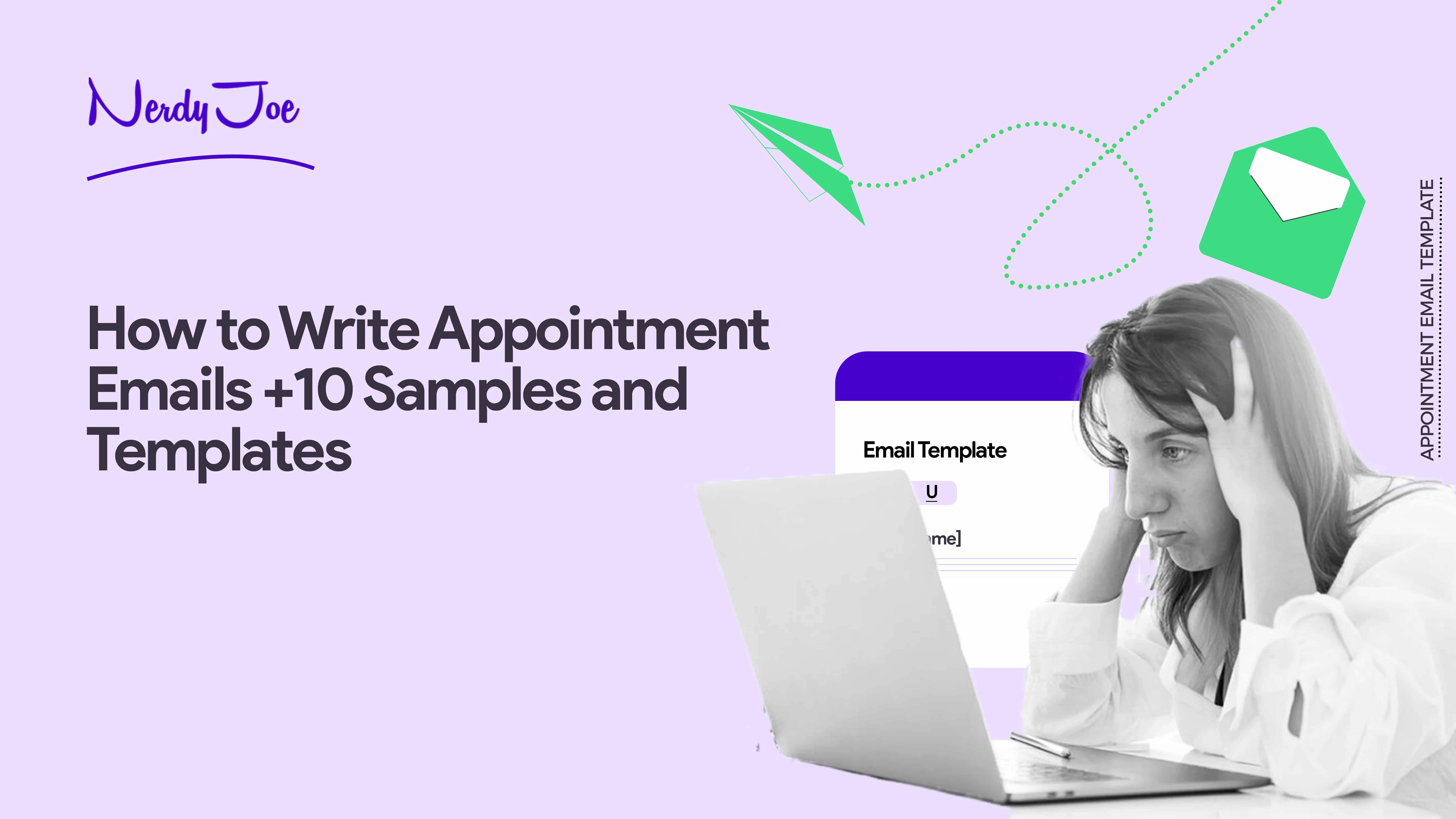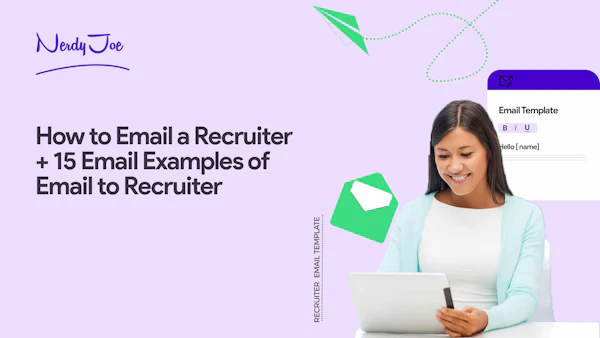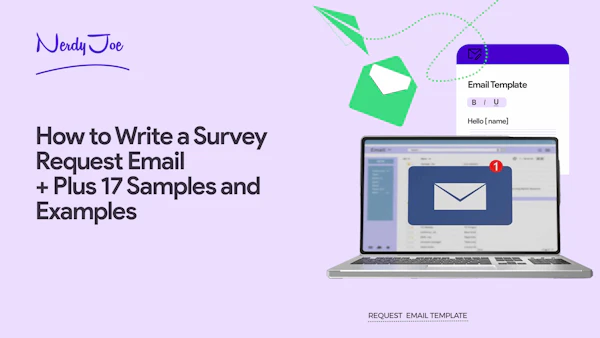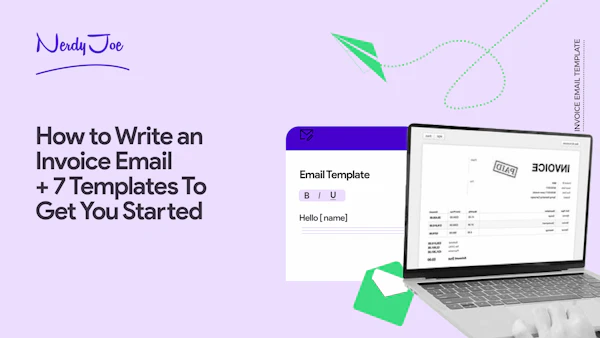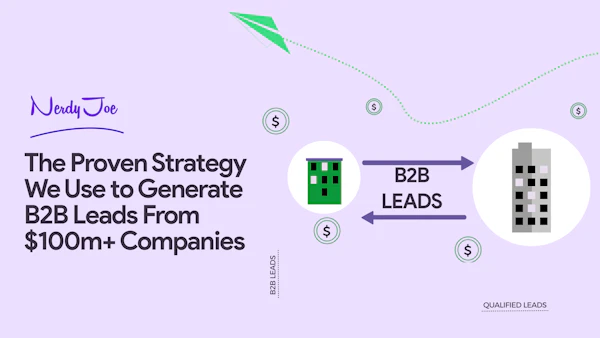So, you’ve finally managed to get a prospective client interested in your services. You’ve invested hours of work in lead nurturing and product demos.
The client seems ready to move to the next stage — a face-to-face appointment, perhaps to close the deal or explore collaboration opportunities.
Now, all you need to do is secure that meeting slot in their busy schedule. Seems easy, right? Well, not always.
For many professionals, writing the perfect appointment email is where things start to go south.
You know what you want to say, but somehow, the words just don’t flow. You worry about sounding too pushy, or maybe too casual.
One misstep and your email could be doomed to be unread, jeopardizing the relationship you’ve spent so much time building. The good news is, you’re not alone — we got you.
If you are looking to write an effective appointment email, this is the article you need. We’ll teach you what to include and how to format your appointment-setting emails.
We also create unique appointment email templates you can emulate or edit to create your own more conveniently.
Let’s get started.
Note: Struggling to get replies or book meetings with prospects that fit in your ICP? We’ll help you get 6 SQLs or book 6 meetings with prospects that are ready to buy for only $999/month. Book a 15-minute consultation now.
What is an appointment email, and why is it important?
An appointment email is a business email that you send to confirm, remind, or set a date and time for a specific engagement or meeting.
These emails can be formal or informal, depending on the context, and can be used for various purposes — from setting up a job interview to confirming a doctor’s appointment, or simply scheduling a casual coffee catch-up with a friend.
In most cases, the appointment email serves as the bridge between the initial meet-up and a productive relationship.
That said, appointment emails are important in several scenarios, but when it comes to business or professional dealings, their importance lies in the following:
Clear communication: Appointment emails eliminate any potential ambiguities. When both parties have a written confirmation, there’s a reduced risk of misunderstandings or no-shows.
Professionalism: Sending a formal appointment email demonstrates professionalism and respect for the other party’s time. It shows that you’re organized and considerate of their schedule.
Efficiency: Having a confirmed date and time allows both parties to plan their day or week accordingly. It minimizes disruptions and helps manage time effectively.
Reminder and documentation: Emails serve as a reminder for the scheduled appointment. Moreover, they provide a written record, which can be referred back to if there’s any confusion regarding the date, time, or other details.
Building trust: When people know what to expect and when, they’re more likely to view the relationship—be it professional or personal—as reliable.
How to write an appointment email
Here is what you need to say in your appointment email and how to format it for maximum engagement.
Key elements of an effective appointment email
So, what should you include in your appointment email? Keep in mind that your goal with this email is to request an appointment, tell the recipient why you must meet, and provide all the necessary information and details so that they make it.
Below is a breakdown of the various components that make up an effective appointment email.
Clear subject line: You have to tell the recipient exactly what the email is about before they open it.
Polite salutation: The email should start with a polite greeting that addresses the recipient respectfully.
Purpose of the appointment: Why you wish to schedule this meeting.
Date and time suggestions: Options for the appointment time and date.
Duration: How long the appointment is expected to last.
Location or platform: Where the appointment will take place, whether it's in-person or through a digital medium like Zoom.
Call to action: Asking the recipient to confirm the appointment.
Polite ending and signature: Ending the email courteously and including your signature for a professional touch.
So, now comes the question of how you must format all these into your email.
Appointment email format
As you can tell, all emails are structured into three main parts: the subject line, the email body, and the ending; appointment emails are no different. Let’s discuss how you should write each section.
Appointment email subject line
The subject line acts as the doorway to your email. An effective subject line should be attention-grabbing and precise. It should also be simple so that the recipient knows exactly what to expect as they open the email.
If your request is urgent, the subject line must also relay the urgency or importance of the email’s content. Here are some examples of appointment email subject lines you can use or learn from:
“Proposed meeting date: [date]”
“Request for an appointment: [purpose/topic]”
“Confirming our [type of meeting] on [date]”
“Setting up our next catch-up”
“I need to cancel our appointment”
“[your name/your company] meeting request for [date]”
Appointment email body
Start the email body with an appropriate salutation.
Write an appropriate email salutation
Courteous greetings work all the time. But if you prefer, you can tailor it to your relationship with the recipient.
Here are some examples:
Formal: “Dear Mr./Ms. [last name],”
Less formal: “Hello [first name],”
Casual: “Hi [first name],”
Propose specific date and time suggestions
Clearly propose or request specific timings. If you are flexible with your time, you can offer two or three options to make it more convenient for your recipient and increase the likelihood of finding a mutually convenient slot.
Here is how you can phrase this:
“I would like to propose we meet on [date] at [time]. If this doesn’t work for you, I’m also available on [alternative date] or [another alternative date].”
Detail the purpose of the appointment or the request
Plainly state the reason for the appointment. First, this helps the recipient determine whether or not they should grant your appointment request. Also, if they’re considering a positive response, it helps them prepare accordingly.
Here is a simple way to include this in your email:
“The purpose of our meeting is to discuss the upcoming marketing campaign and finalize the strategies.”
Include the duration of the meeting
State the expected duration of the meeting. It helps your recipient block off that time in their schedule or know upfront so they can suggest a more convenient duration. Here are some phrasing examples for this:
“I anticipate our discussion will take around 30 minutes.”
“Please allocate 2 hours for this workshop.”
Mention the location or platform for the meeting
Clearly specify if the appointment is in person or virtual. If virtual, include relevant links or details. If it’s in person, let them where.
In-person: “Let’s meet at [venue address].”
Virtual: “The meeting will be held on Zoom. I'll send a link closer to the date.”
Appointment email ending
The appointment email ending also contains three elements: the closing line, the sign-off, and the email signature.
Write a polite email closing line
Here, you want to conclude your email politely and open the door for potential questions or modifications to your proposed plan. Here are some examples of email closing lines you can emulate here:
“Please let me know if this works for you or if there are any changes needed.”
“Looking forward to our discussion. If there are any materials or points you'd like to cover, feel free to share in advance.”
“Thank you for your time, and I await your confirmation.”
Add an email sign-off
Sign off with an appropriate email sign-off. Here are some examples of sign-offs you can use:
“Best regards,”
“Cheers,”
“Talk to you soon”
“Warm regards”
Add an email signature
Lastly, end your email with a professional email signature that contains all the important information about you and makes it easy for the recipient to reach out to you if need be. Here is an example:
Ibrahim Fun
Senior Marketing Manager, XYZ Corp.
Phone: (123) 456-7890
Website: www.xyzcorp.com
LinkedIn: [LinkedIn Profile Link]
10 appointment email templates and sample emails you can emulate
Now that we’ve discussed everything you need to know about appointment emails and how to write them, here are 10 appointment email templates you can use to write your own.
1. General appointment request email template
A general appointment request email is versatile and can be used for various purposes, from seeking a catch-up chat with a colleague to establishing a first-time meeting with someone you’ve not met before.
The best tip for writing this email is to make your request straightforward. Simply state the purpose of the meeting and provide flexibility in terms of scheduling so that your recipient can choose what’s convenient for them. Here is a template for this:
Subject line: Meeting request for [purpose]
Hello [name],
I hope this finds you well. I’m reaching out to request a meeting to [specific reason for the meeting]. I believe our discussion could be mutually beneficial.
I’m available on [date] at [time] or [alternative date] at [alternative time]. Please let me know which suits you best.
Thank you for considering my request.
Warm regards,
[your name]
[your signature]
2. Interview appointment email sample
The interview appointment email is a formal request to potential candidates, informing them about the opportunity to discuss their application further. You can start by expressing gratitude for their application and their availability for the upcoming appointment.
Then, you provide details about the interview—like its format and expected duration—and clearly state the proposed time. Here is an appointment email sample for this:
Subject line: Interview invitation at [company name]
Dear [candidate’s name],
Thank you for applying to [position name] at [company name]. We were impressed with your credentials and would like to invite you for an interview.
We propose [date] at [time]. The interview will be held [in our office at address/via zoom], and it should last about [duration].
Please confirm your availability or suggest another time if necessary.
Best regards,
[your name]
[your signature]
3. Client meeting request email sample
If your goal is to schedule a meeting with a client, discuss specifics about a project, get feedback, or introduce a new idea, this is the appointment email template you need for it. Your main job here is to emphasize the value of the meeting for the client, show respect for their time, and provide clear details. Here is the template:
Subject line: Meeting request: Discussing project [project name]
Dear [client’s name],
We are exploring a couple of directions to move to for the [project name], and I would like for us to meet and discuss [specific aspect]. This would help in aligning our strategies and ensuring we meet your expectations.
Would [date] at [time] be convenient for you? If not, please suggest a time that works for you.
Thank you for your time and collaboration.
Best,
[your name]
[your signature]
4. Team meeting request email template
This is the perfect appointment email to gather your team to brainstorm, update on progress, or make collaborative decisions. It should be short and straightforward. A couple of lines will do just fine.
So, plainly describe the objective of the meeting and ensure clarity on the details. Here is an appointment email sample for this:
Subject line: Team meeting: [purpose or topic]
Hello team,
I’d like to schedule a team meeting to [discuss/brainstorm/review] [specific topic or project]. Your insights and contributions will be invaluable.
Proposed time: [date] at [time], [venue or platform]
Please confirm your availability. If you have additional points to discuss, let me know in advance.
Thanks,
[your name]
[your signature]
5. Consultation appointment email sample
This is the type of appointment email professionals like doctors, consultants, or lawyers use to confirm a session with their clients or patients. It typically contains basic information about the consultation’s purpose, duration, and any preparations the client should make. Lastly, it also acts reminder email to get the recipient to provide details for appointment confirmations.
Here is a template you can use here:
Subject line: Your consultation appointment with [your name/company]
Dear [client/patient’s name],
Thank you for scheduling a consultation with [your name/company]. We have set your appointment for [date] at [time].
Purpose: [reason for the consultation]
Duration: Approximately [duration]
[If necessary: “Please ensure to bring/prepare [specific documents or information].”]
Please confirm your attendance or let us know if there's a need to reschedule.
Regards,
[your name/reception desk]
[your signature]
6. Rescheduling appointment email template
There can be a need for a previously set appointment to be changed to a new date or time. While this can be unfortunate, the right email will eliminate any possible frustration and transition you to the new set date or time smoothly.
So, as you write this appointment email, it’s important to be courteous, acknowledge the change, offer alternatives, and be ready to compromise. Also, you have to apologize for the inconvenience and provide a reason, if appropriate, before suggesting new dates/times. Here is a template for this:
Subject line: Rescheduling our meeting on [original date]
Dear [recipient’s name],
Due to [a prior commitment/unforeseen circumstances], I’m unable to meet on [original date]. I sincerely apologize for any inconvenience this may cause.
Would [new date] at [new time] work for you? If not, please suggest a few timings, and I’ll do my best to accommodate.
Thank you for your understanding.
Best regards,
[your name]
[your signature]
7. Cancel appointment email template
Sometimes, circumstances demand that we cancel an appointment entirely. You have to inform the other party with the utmost courtesy. Your email to cancel the appointment should express regret, provide a reason (if possible and appropriate), and offer to reschedule if necessary.
Here is a template you can use to write this appointment email effectively:
Subject line: Cancellation of our meeting on [date]
Hello [recipient’s name],
I regret to inform you that I have to cancel our meeting scheduled for [date]. [Optional reason: Due to unforeseen circumstances/personal reasons, I won't be available.]
I deeply apologize for any inconvenience. If required, I’d be happy to reschedule to a time that suits us both.
Warm regards,
[your name]
[your signature]
8. Networking or coffee catch-up appointment email template
These are less formal emails intended to foster personal connections and build networks. It’s typically a straightforward email to someone you know or have already met asking to meet for a quick catch-up. Be genuine, briefly state your purpose, and suggest a casual meet-up.
Here is a template you can use:
Subject line: Coffee catch-up?
Hey [recipient’s name],
It’s been a while since we last connected! I’ve been keen to hear about [a recent event/project in their life or work]. How about a coffee catch-up next week?
Let me know when you're free, and we can set something up. It’d be great to reconnect.
Cheers,
[your name]
[your signature]
9. Follow-up or appointment reminder email after a missed appointment
This is a delicate email, aiming to address a missed appointment without sounding accusatory or pushy. It needs to be just a quick reminder to get the prospect's attention and schedule a meeting for a more convenient time.
So, show the recipient that you understand why they have not replied or showed up and gently remind them of the missed appointment. Also, propose a new time or ask for their availability and leave your contact details so they can get back to you.
Here is an email template you can use to write appointment reminders for missed appointments:
Subject line: Missed our meeting – Reschedule?
Hi [recipient’s name],
I noticed we missed our scheduled meeting on [date]. I hope everything is okay. Just wanted to check in and see if you'd like to reschedule.
Please let me know your availability, and we can find a new time that works.
Best,
[your name]
[your signature]
10. Appointment confirmation email
Appointment confirmation emails help you reaffirm scheduled meetings or appointments, ensuring both parties are aligned. If you’re writing this, simply reiterate the appointment’s details and express enthusiasm or gratitude for the upcoming meeting.
Here is a template you can emulate to confirm a scheduled appointment:
Subject line: Confirmation: Meeting on [date] at [time]
Hello [recipient’s name],
I’m writing to confirm our meeting on [appointment date] at [time], [location/platform]. I look forward to discussing [topic/agenda].
Please let me know if there are any materials or topics you’d like to cover in advance.
See you then!
Best wishes,
[your name]
[your signature]
Key takeaways
Different scenarios necessitate different approaches. Whether it's a casual coffee catch-up, a formal client meeting request, or a gentle reminder about a missed appointment, ensure that your email tone and content align with the context and your relationship with the recipient.
The essence of an effective appointment email is clear communication. Ensure the purpose, date, time, and platform (if it’s a virtual meeting) are stated unequivocally with all the necessary details. Avoid any ambiguities that might lead to misunderstandings or missed appointments.
Don’t underestimate the importance of confirming an appointment. Appointment confirmation messages not only serve as reminders but also solidify the commitment from both parties, reducing the chances of no-shows and fostering reliability.
Struggling to get replies or book meetings with prospects that fit in your ICP? We’ll help you get 15 SQLs or book 6 meetings with prospects that are ready to buy for only $2,199/month. Book a 15-minute consultation now.
Note: Struggling to get replies or book meetings with prospects that fit in your ICP? We’ll help you get 6 SQLs or book 6 meetings with prospects that are ready to buy for only $999/month. Book a 15-minute consultation now.

